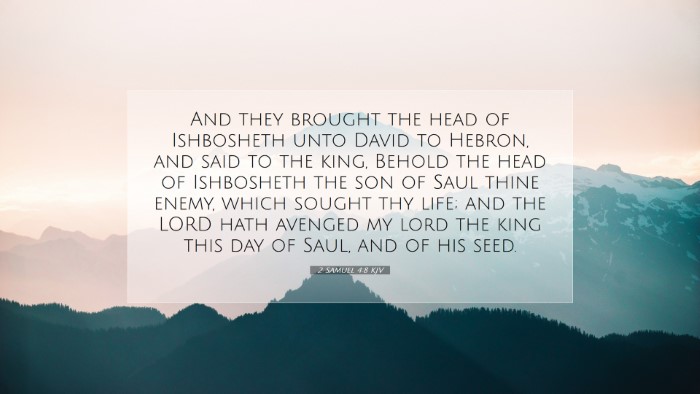Old Testament
Genesis Exodus Leviticus Numbers Deuteronomy Joshua Judges Ruth 1 Samuel 2 Samuel 1 Kings 2 Kings 1 Chronicles 2 Chronicles Ezra Nehemiah Esther Job Psalms Proverbs Ecclesiastes Song of Solomon Isaiah Jeremiah Lamentations Ezekiel Daniel Hosea Joel Amos Obadiah Jonah Micah Nahum Habakkuk Zephaniah Haggai Zechariah Malachi2 Samuel 4:8
2 Samuel 4:8 KJV
And they brought the head of Ishbosheth unto David to Hebron, and said to the king, Behold the head of Ishbosheth the son of Saul thine enemy, which sought thy life; and the LORD hath avenged my lord the king this day of Saul, and of his seed.
2 Samuel 4:8 Bible Commentary
Commentary on 2 Samuel 4:8
Bible Verse: "And they brought the head of Ish-bosheth unto David to Hebron, and said to the king, Behold the head of Ish-bosheth the son of Saul thine enemy, which sought thy life; and the Lord hath avenged my lord the king this day of Saul, and of his seed."
Introduction
The account of Ish-bosheth's death is crucial in understanding the political landscape of ancient Israel during the transition between Saul's reign and David's. This verse encapsulates the culmination of conflict and intrigue surrounding the house of Saul and emphasizes the themes of divine justice and royal legitimacy. By examining insights from renowned biblical commentators, we can glean significant theological, historical, and moral lessons from this text.
Contextual Background
The backdrop of this event stems from the civil strife following King Saul's death. Ish-bosheth, Saul's son, was made king over Israel while David reigned over Judah. The rivalry between these two factions set the stage for conflict and betrayal, ultimately leading to Ish-bosheth’s downfall.
Commentary Insights
- Matthew Henry:
Matthew Henry highlights the role of divine providence in the death of Ish-bosheth. He notes that while the murder was executed by agents, it was God who removed Ish-bosheth from the throne, thereby fulfilling God's promises to David. This act serves not only as a means of vengeance for David but also as a way in which God's justice prevails in the unfolding narrative of Israel's leadership.
- Albert Barnes:
Barnes emphasizes the audacity of the act committed against Ish-bosheth, illuminating the perilous state of leadership in a divided Israel. The murderers, believing they were serving David, mistakenly thought that his ascent to power could be hastened through such a treacherous act. This illustrates the human tendency to act impulsively, thinking that they can hasten God's purposes by unethical means.
- Adam Clarke:
Clarke puts forth a detailed historical analysis of the events surrounding Ish-bosheth's death, taking into account the various factions present in Israel at that time. He argues that the act of presenting Ish-bosheth's head to David was meant to earn favor; however, it ultimately backfires. Clarke notes that David's reaction to the act showcases his integrity and commitment to justice, as he did not reward the murderers but condemned their actions.
Theological Themes
Several key theological themes emerge from this text:
- Divine Justice:
The death of Ish-bosheth can be interpreted as an example of divine justice, where God avenges David from the house of Saul. David, aligned with God's purposes, is often depicted as a righteous king, unlike the chaotic rule of Saul.
- Moral Integrity:
David's response to the murderers underscores a significant lesson about moral integrity. Rather than rejoicing in their act, he condemns it, thus portraying the ethical governance expected of leaders. This aspect invites pastors to reflect on their own leadership responsibilities and the importance of upholding moral standards in their ministries.
- Human Ambition and Its Consequences:
The ambition exhibited by the murderers serves as a cautionary tale about the lengths to which individuals will go for power. It reflects a broader biblical principle that those who seek greatness through dishonest means will ultimately face divine judgment.
Practical Applications for Today
- Leadership Lessons:
Pastors and church leaders can take away from this narrative the importance of seeking God's guidance in leadership decisions, avoiding manipulative tactics to achieve aims. David's response to his adversaries models the idea of leading with integrity.
- Trust in God’s Timing:
This passage encourages believers to trust in God's timing and sovereignty, illustrating that He will bring about justice in His own way. Individuals are reminded to avoid shortcuts that contradict their faith and morals.
- Community Accountability:
The reaction of Israel to the leadership struggle should inform contemporary believers about the importance of community accountability in matters of leadership. Leaders are called to be accountable to their communities, reflecting God's principles and character.
Conclusion
2 Samuel 4:8 serves as a poignant reminder of the intricate dance between human ambition and divine will. The insights from notable biblical commentators help readers reflect deeply on issues of justice, leadership integrity, and the unfolding narrative of God's redemptive plan. As we wrestle with the implications of this text, theologians and students alike are encouraged to draw wisdom from the moral landscape of David's ascent to kingship and the ethical challenges embedded within leadership.


